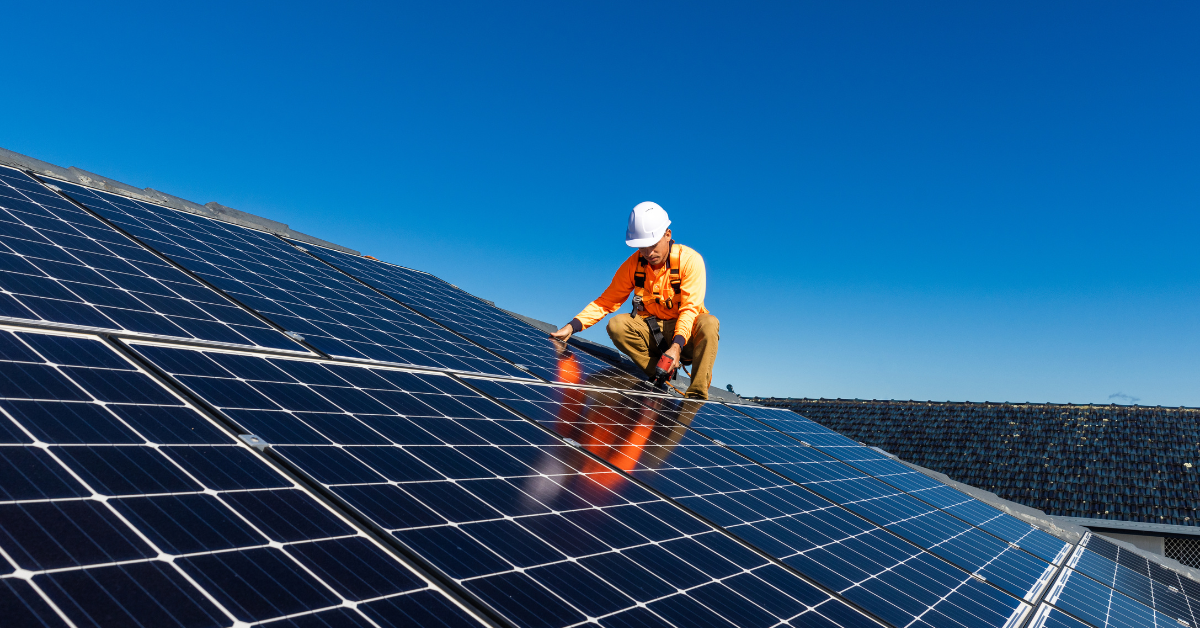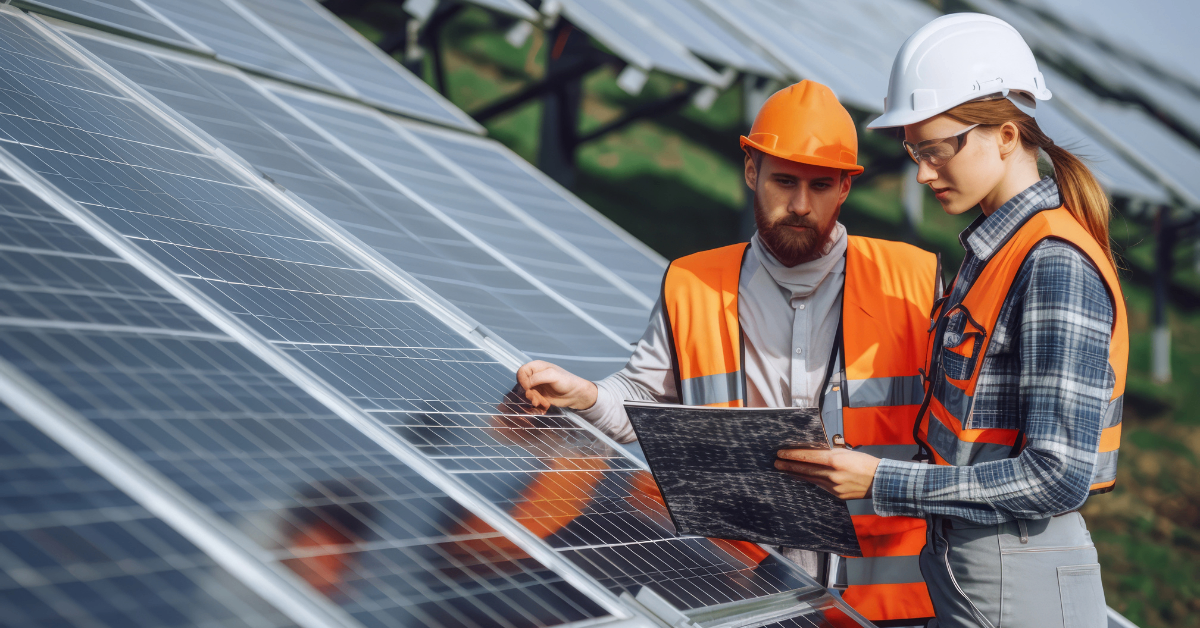The Bright Future of Solar: Top Renewable Energy Jobs to Watch in 2026

What was a new technology in the early 2000s is now one of the most popular green energy sources worldwide. In June 2025, solar energy overtook all other sources to become the EU’s leading provider of electricity, supplying 22.1% of total power generation.
Solar energy is playing an increasingly important role in the EU’s Net Zero targets, reflected in the growing number of jobs across Europe. Many countries are designing smarter and more efficient PV installations, upgrading existing infrastructure, and encouraging households to install PV cells to reduce electricity bills.
As a result, employment in the photovoltaic (PV) industry is projected to expand significantly in the coming years, with forecasts suggesting between 540,000 and over 1 million PV workers in Europe by 2026.
This creates unique career opportunities for solar experts who are looking to progress their career in the renewable energy sector.
Top Solar Jobs in 2026
PV Design Engineer
In 2026, the focus will be on developing more efficient and reliable materials, solar cells, and power electronics to meet Europe’s growing electricity demand. Advanced materials and high-performance solar cells will be key, as they determine how effectively sunlight is converted into electricity. However, their efficiency is highly sensitive to environmental factors such as temperature, dust, and shading, which can significantly reduce energy output, especially with growing extreme weather conditions. This highlights the ongoing need for innovation in materials and design to enhance system resilience and reliability. Meanwhile, sophisticated power electronics play a critical role in ensuring that the generated energy is efficiently stored, managed, and delivered to the grid or end users.
As solar adoption skyrockets globally, the demand for engineers who can innovate in these areas is rapidly growing. PV design engineers play a crucial role in ensuring solar installations are safe, efficient, and optimised for maximum energy yield. Their expertise in electrical design, system layout, and performance modelling helps reduce losses and improve overall reliability. As solar adoption expands, skilled PV design engineers are essential to delivering high-quality, cost-effective, and sustainable energy solutions.
Typical skills required for PV design engineers include:
- PV system design
- Electrical design & power systems
- Energy yield & performance modelling
- Site assessment & layout design
Solar Project Manager
The European Commission aims to achieve at least 700 GW of solar PV capacity by 2030 to strengthen energy independence across the EU. To reach this target, numerous photovoltaic (PV) projects are being developed throughout Europe. As a result, jobs across deployment, e.g. the installation of solar panels, are dominating the PV solar job market with over 360,000 workers in Europe to successfully execute these PV projects.
Other segments of the PV value chain are:
- Manufacturing: 44,178
- Operations & Maintenance: 40,101
- Decommissioning & recycling: 14,009
This surge in activity creates strong demand for project execution roles — the more solar farms, rooftop installations, battery storage systems, and grid integrations are deployed, the greater the need for skilled managers to coordinate stakeholders, sites, technologies, and regulatory processes.
Project managers will therefore play a crucial role in delivering the EU’s energy goals, ensuring smooth coordination across multidisciplinary teams while managing budgets, schedules, and compliance requirements. This is why the position of solar project manager is expected to remain one of the most in-demand roles in 2026.
Typical skills required for solar project managers include:
- Stakeholder management
- Cross-team communication
- Organisational skills
- Technical and regulatory knowledge of PV systems
- Experience with budget management
PV installer
PV installers are the backbone of solar projects, carrying out the installation and commissioning of new PV systems. These professionals are responsible for site assessment, system installation, electrical connections, testing, commissioning, and troubleshooting.
As the front line of the renewable energy transition, PV installers combine hands-on work with specialised technical expertise. Typical educational backgrounds include electrotechnology or electrical engineering, supported by nationally recognised certifications and training programmes to ensure up-to-date market knowledge and compliance with industry standards.
To strengthen Europe’s skilled solar workforce, the EU has launched the European Solar Academy, aiming to train 65,000 workers over the coming years, recognising the importance of skilled PV installers.
Typical skills required for PV installers are:
- Electrical engineering
- Health & safety knowledge
- Problem-solving
- Teamwork
Grid Engineer
In 2026, grid engineers play a crucial role in the solar PV industry by ensuring that rapidly expanding solar generation is reliably and efficiently integrated into power grids. They manage the variability of solar power using advanced control strategies, predictive algorithms, and energy storage solutions, while maintaining voltage and frequency stability. Their work also involves upgrading grid infrastructure and ensuring compliance with evolving grid codes and standards, enabling solar systems to provide reactive power and ride through fluctuations.
As more large-scale solar farms, rooftop arrays, and storage systems come online, grid engineers help optimise energy flows across regions and maintain safe, stable connections. Their role supports Europe’s strategic goals of energy independence and decarbonisation, ensuring that renewable generation is not only added to capacity totals but integrated meaningfully and sustainably — making this one of the most important roles in the solar sector.
Typical skills required for grid engineers are:
- Advanced control systems
- Energy storage management
- Grid code compliance
- Voltage and frequency regulation
- Predictive modelling and optimisation
O&M Specialist
Operations & Maintenance (O&M) is a crucial segment of the photovoltaic (PV) value chain, accounting for approximately 9% of the EU solar workforce, a share comparable to that of the manufacturing sector. Employment in deployment roles is also expected to continue growing in the coming years.
O&M covers all activities necessary to ensure that solar installations operate efficiently and reliably throughout their operational lifespan, which can span several decades. Professionals in this field are essential for maximising energy output, protecting investments, and supporting the long-term growth of the solar industry.
The role of O&M specialists relies heavily on technical expertise, which is often in short supply given the high demand for skilled personnel across Europe. Individuals working in O&M typically have a background in electrical, renewable energy, or mechanical engineering, and ongoing education and training are an important part of the job to maintain system quality, safety, and compliance.
Typical skills required for O&M specialists include:
- Technical knowledge of PV systems and electrical systems
- Troubleshooting & problem solving
- Data analysis & monitoring
- Knowledge of safety procedures and regulations
- Quality assurance
Find your Next Career Step with Amoria Bond
With promising opportunities, solar professionals can look forward to a bright career with strong growth potential. Amoria Bond can assist you in securing your ideal role.
With our specialised solar energy recruitment teams, you can expect a clear and efficient hiring process, with constructive feedback and excellent communication. Our international presence allows us to offer exclusive solar energy positions across Europe, APAC, and North America, supporting your career ambitions.
Upload your CV today, and one of our recruiters will get in touch to discuss your next step in the renewable energy sector!

